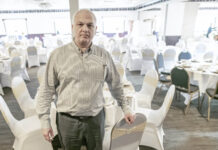After nearly 40 years without a hotel downtown or along the nearby waterfront, it looks as though New Bedford might finally get one.
Lafrance Hospitality Co. is in the process of negotiating a purchase and sale agreement for the Finicky Cat Food property at 16 Front St. on the city’s waterfront.
“We haven’t finalized anything at this point,” said Richard Lafrance, CEO of the Westport-based hospitality company, which owns and operates four Hampton Inn hotels in Massachusetts and one Comfort Inn in New Hampshire. “In a month we can probably announce the whole thing.”
But LaFrance did say the plan is to build a 90- to 100-room hotel on the 2-acre property. The company hopes to start construction by next spring. Lafrance said he estimates it will be a $9- to $10-million project.
If it happens, the hotel deal would come none too soon for the small seaport city.
New Bedford needs a hotel closer to downtown, said Matt Morrissey, executive director of the New Bedford Economic Development Council. The number of tourists visiting the city has increased 11 percent from 2005 to 2006 to a total of 800,000. Morrissey said, however, the there has been a 25 percent growth in the number of visitors in the past few years.
A surge of arts and cultural events and organizations is attracting people, and with that more restaurants and new businesses are opening.
But there is no place for out-of-town visitors to stay, unless they want to stay at the Days Inn off Interstate 195, about four miles from the heart of downtown, or the Comfort Inn, the extended-stay Marriott Residence Inn or the Dartmouth Motor Inn, all of which are about five miles away from the city’s attractions.
The property on Front Street, on the other hand, sits about 300 yards away from historic downtown New Bedford, Morrissey said.
“[The hotel] will be a tremendous asset to overall economic development in the city,” he said. “It’s the missing link.”
Katherine Knowles, executive director of the Zeiterion Theater, which is about 500 yards from where the hotel would be located, used other words to describe the hotel’s contribution to economic development.
Especially from an arts and culture organization’s perspective, Knowles said, a hotel within walking distance is “vitally important” to the economic health of the city.
About 20 percent of the theater’s audience comes from Providence, she said. A smaller percent comes from Connecticut and upstate New York. But Knowles thinks more would come and stay the night of the show if there were a more accessible hotel.
“There is a whole day of activities available downtown,” she said, listing the New Bedford Whaling Museum, the New Bedford Art Museum and a number of galleries, restaurants and the working waterfront. “The hotel would change the dynamic. More people would come for the day.”
In addition, Morrissey said, 33 percent more people are taking the fast ferry from New Bedford to Martha’s Vineyard. He hopes the hotel would sway them to stay in the city a bit longer before or after they take the ferry.
“We have to explain why we don’t have [a hotel] at this point,” he said. “Individuals coming to the city, they look for the hotel … and not having a national brand hotel like a Hilton or Marriott or a high-end boutique hotel … it doesn’t accurately reflect our development activity.”
Since 2000, New Bedford has experienced more than $80 million in renovations to commercial and residential property downtown, though some projects are under way or in pre-construction.
Other hotel deals had been announced and then fell through since then, Morrissey said. But he would not comment as to why.
He did say, however, that Mayor Scott Lang made attracting a hotel developer to the downtown a priority shortly after taking office in January last year.
Around the same time, the NBEDC commissioned a hotel market demand study with Pinnacle Advisory Group. The study concluded that New Bedford is “an emerging market that’s clearly expanding,” Morrissey said. “It said a hotel downtown/waterfront is warranted.”
The NBEDC used the results of the study to attract about a dozen hotel developers to visit the city.
“Lafrance was the most aggressive in creating a sense of understanding of the market,” Morrissey said. “And in understanding what we were hoping would be developed.” •
No posts to display
Sign in
Welcome! Log into your account
Forgot your password? Get help
Privacy Policy
Password recovery
Recover your password
A password will be e-mailed to you.











